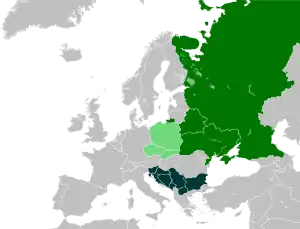The old-settlers (Russian: старожилы) are the Russian settlers of the Russian North (the Pomors), Ural, Siberia (the Siberians), the Russian Far East (the Kamchadals) and the former Russian America (under the name "Russian Creoles") in the 11th – 18th centuries and their descendants.[1][2][3] Among them, interethnic marriages, borrowing words from local languages and adopting the culture of Indigenous peoples were practiced.
A principal part of them were Old Believers at least prior to the rise of the Soviet Union.
Subgroups
- Alaskan Creoles - Creoles of Russian, Siberian, Eskimo, Aleut, and other Alaska Native ancestry.
- Chaldons – Creoles of Russians and native Siberians;
- Kamchadals – descendants of the native Kamchatkan peoples who assimilated with the Russians;
- Kamenschiks – Old Believers in Southern Siberia;
- Karyms and Gurans, – métises of mixing Russians with Buryats and Evenks in Buryatia and Transbaikalia;
- Markovtsy – métises of mixing Russians and Chuvans in Chukotka;
- Pokhodchane or Kolymans – Russians in Arctic Sakha;
- Russkoust'intsy or Indigirschiks – métises of mixing Russians with Yukaghirs, Sakha and Evens in Arctic Sakha;
- Tundra Peasants – métises of mixing Russians with Evenks and Sakha on Taymyr;
- Yakutians or Lena Peasants – métises of mixing Russians with Sakha.
References
- ↑ "Старожилы" [Starozhily (Old-Timers)]. Большая российская энциклопедия [ Great Russian Encyclopedia Online] (in Russian). 2017. Retrieved 2021-09-22.
- ↑ Schweitzer, Peter; Vakhtin, Nikolai; Golovko, Evgeniy (2005). "The Difficulty of Being Oneself: Identity Politics of "Old-Settler" Communities in Northeastern Siberia" (PDF). In Erich Kasten (ed.). Rebuilding Identities. Pathways to Reformin Post-Soviet Siberia. Berlin: Dietrich Reimer Verlag. pp. 135–151 – via Siberian-studies.org.
- ↑ Wixman. Peoples of the USSR, p. 180.
This article is issued from Wikipedia. The text is licensed under Creative Commons - Attribution - Sharealike. Additional terms may apply for the media files.
